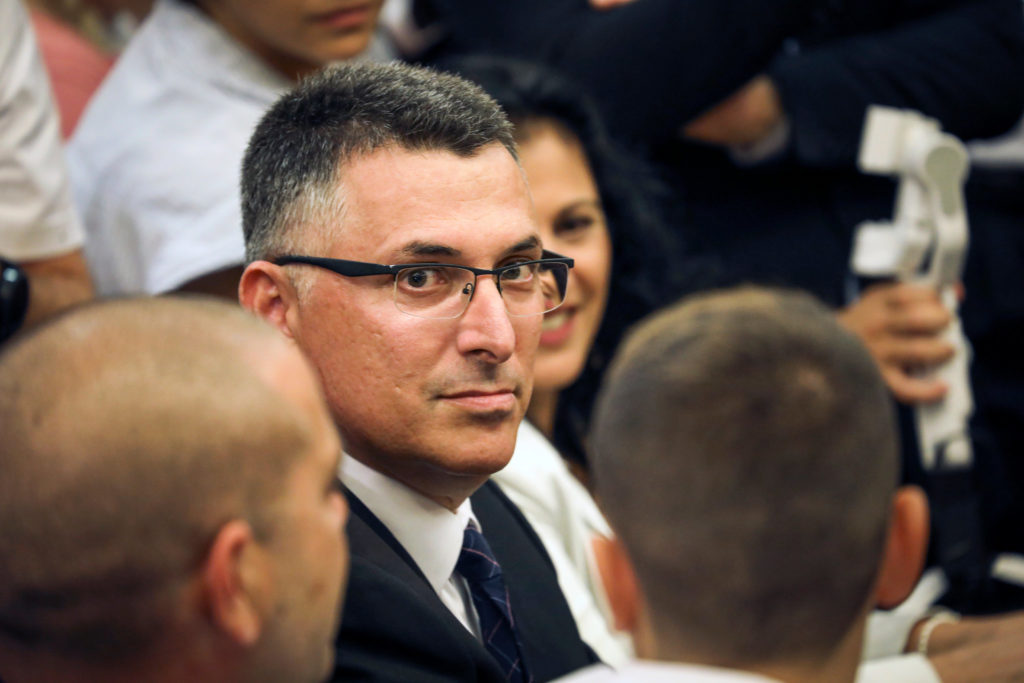Australia/Israel Review, Featured
Succeeding Bibi?
Dec 20, 2019 | Amotz Asa-El

The die is cast. One short, and seemingly technical, statement has launched the struggle for Binyamin Netanyahu’s political estate.
The statement was made by Likud lawmaker Gideon Sa’ar on Nov. 21. It said that Netanyahu has failed twice this year to form a government, and will surely fail again should another election be called. “I can form a government and unite the people,” the bespectacled former education minister claimed.
Netanyahu’s two failures followed last April’s inconclusive election, after which he failed to reassemble his previous coalition, and the consequent election in September, in which Netanyahu’s parliamentary following shrank further, and Likud itself won fewer votes than its main rival, Blue and White.
After no Israeli party succeeded in forming a government by the legal deadline of Dec. 11, Israel is heading yet again to the polls for a third time on March 2, 2020. The political deadlock stems from the failures of both Likud and Blue and White to collect a majority of the Knesset’s 120 members. Two significant Knesset factions – the Israeli-Arab United List’s 13 lawmakers, and the eight commanded by Avigdor Lieberman’s Yisrael Beitenu – have been declining to join either of the prospective narrow coalition government led by either Likud or Blue and White.
The United List did begin talks with Blue and White leader Benny Gantz, but those were cut off abruptly by Blue and White after United List lawmakers condemned the IDF’s killing in Gaza of Islamic Jihad military leader Baha Abu al-Ata on November 12 as designed to serve Netanyahu’s personal political needs.
Lieberman, for his part, was courted by both Netanyahu and Gantz, but has rejected each, insisting instead that the two should together form a broad national unity government – with or without his own faction. The hawkish, but militantly secular, Lieberman says that only such a unity government can reboot the secular majority’s relations with the ultra-Orthodox public and reform the religious impositions imposed by ultra-Orthodox politicians.
This, then, was the context in which Sa’ar decided to cross the Rubicon and stage the challenge that further complicates an already embattled Netanyahu’s political situation.
A 52-year-old lawyer, Sa’ar is not a shoo-in to succeed the man who has led Likud for 21 of the past 27 years, nor is he alone in the contest he has touched off.
Unlike the 70-year-old Netanyahu, who built his public profile as a diplomat, first as deputy ambassador in Washington when he was 33, then as ambassador to the UN, Sa’ar’s public career began as a journalist when he was a student at Tel Aviv University. He then proceeded to the judiciary, where he became, at 29, an assistant to the Attorney-General, and later to the State Prosecutor.
The shift to politics came at age 33, when he became Netanyahu’s cabinet secretary in 1999, just a few months before Netanyahu’s defeat by Ehud Barak. Sa’ar’s transition from his role in the cabinet to private legal practice lasted only two years, because Ariel Sharon’s defeat of Barak in the 2001 election resulted in Sa’ar’s return as cabinet secretary again.
From there the road to elected office was short. Entering the Knesset in 2003, Sa’ar later served one stint as Netanyahu’s education minister and another as interior minister before falling out with him.
Details of that disagreement have never been disclosed, but the bottom line was that in 2014, Sa’ar left politics. He returned only late last year, after teaching political science at a college and publishing papers with a strategic think-tank.
Sa’ar’s divorce from his wife of 22 years when he was education minister, and his subsequent marriage to TV news anchor Geula Even, added a measure of flamboyance to his previous image as a cold and understated lawyer. Sa’ar has four children, two from each wife.
Despite the break he took from politics, Sa’ar kept in close touch with party activists across the country, many of whom rightly assumed his return to the fray was only a matter of time and betting on him as Netanyahu’s successor might someday pay off.
Now these old investments of Sa’ar’s are being tested. Some have indeed paid dividends with endorsements of his candidacy – including from the mayors of Ofakim, near the Gaza Strip, and Akko, north of Haifa, both working-class Likud bastions.
At the other end of the social spectrum, in glitzy Ramat Gan to Tel Aviv’s east, Mayor Carmel Shama-Hacohen has joined Sa’ar’s endorsers. This potentially represents the possibility of Sa’ar gaining support from some of Ramat Gan’s moneyed elite, as well as bringing some diplomatic credibility to Sa’ar’s candidacy, Shama-Hacohen served as Israel’s Ambassador to UNESCO earlier this decade.
Sa’ar’s support base then expanded further, to the chairman of the Regional Council of Samaria, Yosi Dagan, whose constituency of West Bank settlers is particularly meaningful in the Likud party, which prides itself on having built most of those communities.
Later endorsed by the mayors of Israel’s southernmost and northernmost towns, Eilat on the Red Sea and Metula on the Lebanon border, Sa’ar’s bid seems more solid than some initially assumed. Even so, his chances of defeating Netanyahu remain slim at best. For now, Sa’ar’s accomplishment is limited to having imposed a primary election on the Likud that Netanyahu had hoped to avoid.
Moreover, Sa’ar’s bid is itself being challenged by several other contenders for the Likud leadership.
Several candidacies are electoral nonstarters. One example is former Jerusalem mayor Nir Barkat, 60, a hi-tech millionaire who has been a lawmaker only since April and has never been a minister, which makes him considerably less experienced than his competitors.
Meanwhile, Internal Security Minister Gilead Erdan, a 49-year-old lawyer, has been a minister for 10 years, but has lost much of his political momentum in his current position, appearing indecisive while repeatedly failing to install a police chief who would both last and be effective.
Other would-be contenders for Likud’s leadership are currently stranded outside the party and are therefore in no technical position to join the fray. That includes Defence Minister Naftali Bennett, 47, and former justice minister Ayelet Shaked, 43, both of the New Right faction – both believed to be eager to join Likud and someday vie for its leadership.
Altogether outside the race is Avigdor Lieberman, who earlier this decade might have been a natural candidate, but now is seen among Likud activists as a traitor. Having masterminded September’s repeat election, and then arguably caused the current political impasse, the former defence minister has blocked Netanyahu’s room to manoeuvre more effectively than anyone in his entire political career.

Foreign Minister Yisrael Katz: Hoping quiet loyalty will get him Netanyahu’s nod to succeed him
The most potent rival Sa’ar faces, outside Netanyahu himself, is doubtless Foreign Minister Yisrael Katz.
During a decade as transport minister Katz has earned kudos, even among Likud’s rivals, as an efficient administrator who dramatically expanded Israel’s network of highways and railways, launched the Tel Aviv subway project, and also reduced air travel prices by opening new international routes and imposing more competition on the airlines.
A lifelong politician, the 64-year-old Katz is also one of the most powerful people in the Likud party apparatus, having served for the past 15 years as chairman of the party’s secretariat.
Katz has so far displayed loyalty to Netanyahu, and implies he will sit out the primary election that has been set for Dec. 22. That strategy may work if Sa’ar is trounced by Netanyahu. However, should Katz come to suspect that Sa’ar will emerge with a substantial electoral achievement to his name, even while losing, he might change his mind and decide to run as well.
Finally, there is an improbably but not impossible scenario whereby Netanyahu is replaced not by his party, but by the Knesset – if he agrees to a deal in which he gets a presidential pardon for the three corruption cases currently pending against him in return for his retirement from public life. This would mean that the legislature, not the Likud, must elect a lawmaker to replace him.
In such a case, there is a possibility that Netanyahu will be succeeded by Knesset Speaker Yuli Edelstein, a former minister of immigrant absorption who has little ambition to be prime minister. Edelstein’s real goal is to succeed President Reuven Rivlin when his term ends in summer 2021.
Odds of such a scenario eventuating are low, but if it does materialise and Edelstein become PM, the symbolism would be immense, considering that 32 years ago, Edelstein, now 60, was a prisoner in a Soviet gulag, where he spent three years for clandestinely teaching Hebrew while struggling with the KGB to immigrate to Israel.
Edelstein would surely be perceived by all, including himself, as an interim prime minister, while Sa’ar and Katz contest the Likud leadership, and Blue and White contests Likud’s right to lead government. Then again, Edelstein’s personal profile of a legally spotless record, Zionist sacrifice, and moral inspiration might help cleanse the atmosphere of the political uncertainty and disillusionment that has descended on the Jewish state during the unprecedented political crisis of the past year.
Tags: Benjamin Netanyahu, Benny Gantz, Gideon Sa'ar, Israel






